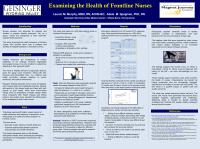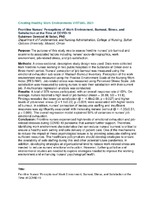| dc.description.abstract | Session presented on Monday, November 9, 2015 and Tuesday, November 10, 2015: Background: Professional nursing views health promoting behaviors to be foundational for holistic wellbeing. Through advocacy and education, nurses encourage patients and families to practice healthy behaviors. It is logical to assume that nurses are knowledgeable regarding the value of health promotion and healthy behaviors. Yet, as a group, nurses are recognized to have less-than-optimal health practices. Recent studies have found that large numbers of nurses reported personal fatigue, inadequate exercise and irregular diets. Motivated by rising health care costs, employers offer incentives to healthcare workers who meet selected criteria goals, such as blood pressure, blood glucose and cholesterol levels as well as body mass index parameters. Few studies have reported the effectiveness of such strategies for direct care nurses. The purpose of this study was to examine frontline nurses' reports of their personal health behaviors and frequency with which health behaviors are practiced. The study's framework draws on the Artinian Intersystem Model for adapting research-based evidence. The model emphasizes that effective strategies must be meaningful and manageable. Prior to identifying interventions and areas for advocacy, planning is approached as an interactive process with target participants. Methods: The study used a descriptive design and convenience sample of RNs and LPNs who provide care directly to patients and families at hospital bedsides or ambulatory clinics. Data were collected at a mid-sized medical center with an active wellness program in a northeast Pennsylvania. Following IRB approval, nurses were emailed an invitation to participate and link to the electronic survey. Informed consent was implied when the survey was completed and submitted. Self-care behaviors were examined using the Health-Promoting Lifestyle Profile II (Walker, Sechrist, Pender, 1995). The tool consists of 52 statements about self-initiated health behaviors that are rated according to frequency (1 = never to 4 = routinely). It is organized into 6 subscales: health responsibility, nutrition, physical activity, stress management, interpersonal relations and spiritual growth. An additional 6 items collected demographics and qualitative comments about professional practice. Validity is established and acceptable reliability is reported. It required 10-15 minutes to complete. Results: Surveys were received from 160 nurses, representing a 21% response rate. Participants' ages ranging from under 30 years (15%) to over 50 years (43%). Most identified themselves as RNs (84%) who work over 36 hours/week. When Lifestyle Profile scores were examined according to age groups (<35 yrs., 35-50 yrs., >50 yrs.), the oldest group nurses reported the highest total and subscale scores. Significant, albeit small, differences found for Health Responsibility (F(2,157)= 4.28; p = .016, 2= .23), Nutrition (F(2,157)= 3.45; p = 0.34, 2= .24), and Stress Management (F(2,157)= 2.13; p = 0.34, 2= .21). Qualitative comments pertained to the difficulties of balancing work, family, and self-care among younger nurses and those over 50 years of age. Conclusions: Participants reported moderate levels of healthy behaviors. Contrary to expectations, the highest frequencies of healthy behaviors were reported by older nurses. This may reflect fewer competing priorities, stronger adaptive strategies or an increased awareness of the impact of lifestyle choices. Additional study is needed to identify potential strategies to motivate and sustain healthy behaviors among frontline nurses. | en |





